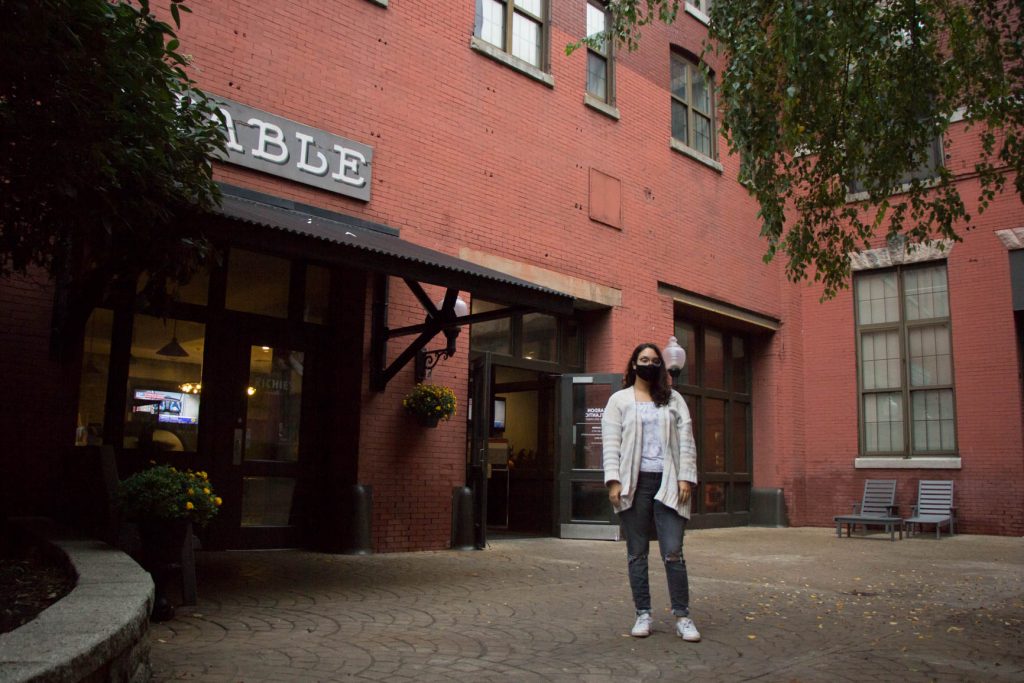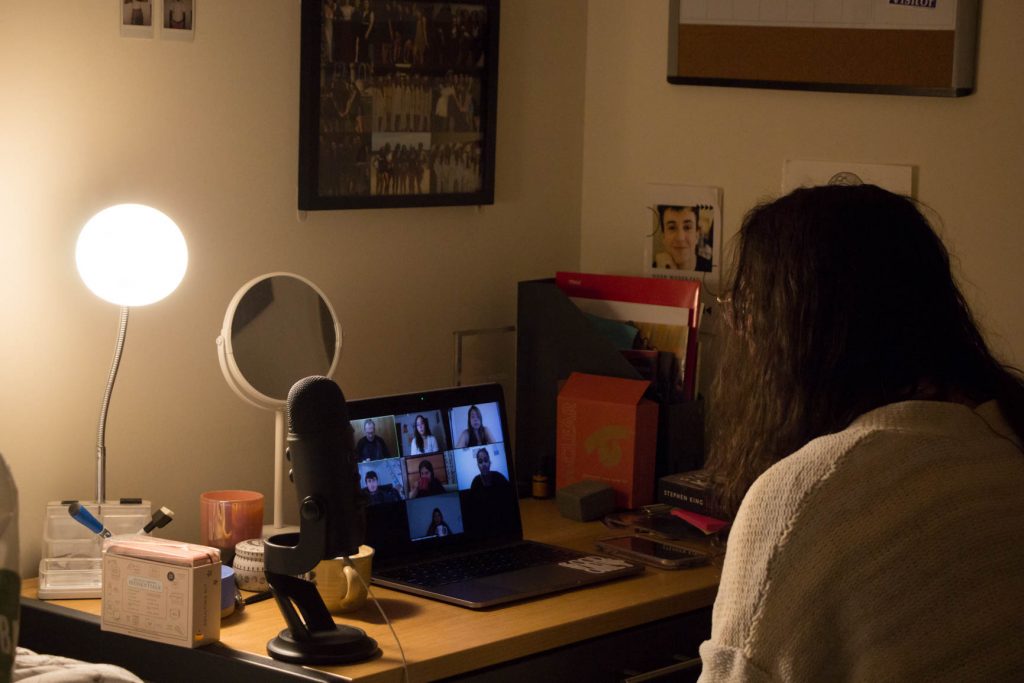
SHIFTING EXPECTATIONS
Jenna Camacho, a senior music education major, trudged through a semester beset by unmotivating course work and COVID-19 concerns as she reconsidered her academic future.
For the first time in her life, Jenna Camacho thought she might not be able to celebrate Rosh Hashanah with her family this year.
Commemorating the Jewish New Year in the Camacho family usually involves a large dinner and attending a three-hour service at their local synagogue near Cherry Hill, New Jersey. But Camacho, who had been living in Kardon/Atlantic Terminal Building, an apartment complex on 10th Street near Montgomery Avenue, apart from her family amid the COVID-19 pandemic, worried she couldn’t find a place in Philadelphia to get tested for the virus quickly enough before the holiday began on Sept. 18.
“That’s a huge thing in the Jewish religion, to be with your family for the holidays,” Camacho said on Sept. 15. “I really don’t want to be trapped in my apartment in Philly because I don’t have a lot of Jewish friends here.”
Finally, after hours spent scouring the internet and calling testing centers, Camacho was able to get a test in Fishtown days before the holiday weekend and saw her family. They celebrated with a dinner at home and invited their extended family to join them via Zoom.
“We make it work,” she said on Sept. 30.
In what was meant to be the start of her final year at Temple University, the Fall 2020 semester marked a period of uncertainty and limbo for Camacho, a senior music education major. Between school, her frontline job and her social life — limited to a “bubble” of her closest friends — she wrestled with the unstable routine of being a student amid the pandemic while charting out her future in a world of constantly shifting expectations.
Camacho is outgoing and has a warm sense of humor and a passion for music. Living with one roommate, she spends her free time hanging out with friends, exercising and singing a capella.
With a vocal concentration, Camacho began the semester as a full-time student, set to take a class in how to teach choral music, a choir ensemble course and four gen-ed and honors classes. But after Temple moved all nonessential courses online due to rising COVID-19 cases among students on Sept. 3, Camacho decided it wouldn’t be worth it to take her singing classes online and went part-time while starting a job as a receptionist at a salon in Rittenhouse Square to help pay her rent.
Before this semester, Camacho had planned to graduate in Spring 2021. But Camacho decided to push her graduation date back a year because she is required to student-teach during her final semester at Temple and does not want to do so virtually.
At the end of September, she was undecided as to whether she would take a full course load in the spring semester if classes were fully virtual again, given how much she disliked online classes.
But, “I need to graduate at some point,” Camacho said on Sept. 30, chuckling.
Singing has earned a dangerous reputation amid COVID-19, because it can easily spread the virus from person to person through air droplets, forcing churches and performance venues to limit or eliminate singing altogether. Not being able to sing in person in classes this year was “devastating” for Camacho, as she valued the community she’s formed with her peers at Temple.
“In a normal semester, we spend a lot of time together going on trips and at concerts,” Camacho said. “So it’s felt like something’s been missing this entire semester.”
Camacho tried to fill the void by singing in a local church choir, spaced 10 feet apart from other singers, beginning in October. She sang at Sunday services starting once a week in an octet and later once every two weeks in a quartet.
She hoped her vocal classes would meet in person in the spring. Singing on mute via Zoom during class time just wasn’t the same to Camacho.
“[It’s] tough for me because I feel like I’m losing out on like, my choir experience,” Camacho said.

By mid-October, Camacho grew tired of online classes, resenting how impersonal they felt and missing the community aspect of in-person learning.
“The longer I take online classes, the more I don’t enjoy them,” she said on Oct. 14. “But, you know, I feel like that’s normal.”
With little opportunity for connecting with other students during class time, and Camacho’s in person social interactions limited to her roommate and a few other students, by mid-semester, Camacho hadn’t made any new friends.
“The only opportunity you really have to talk to someone one-on-one is in a breakout room for 10 minutes,” Camacho said on Oct. 14. “So definitely harder through online classes.”
In late October, Camacho felt discouraged by Temple’s announcement that it would be taking away spring break in the Spring 2021 semester to reduce the likelihood of students traveling and spreading COVID-19.
Spring break is normally the “saving grace” for Camacho when she’s feeling burnout. While she understood the need to reduce the spread of COVID-19 in the future, in the middle of a mentally taxing fall semester, the decision didn’t sit well with her.
“I just feel like I always need a mental health break, and now that’s just being taken away,” she said on Nov. 2. “That’s really scary to think about.”
Around the same time, Camacho’s world was thrown into disarray when a close friend of hers whom she had contact with tested positive for COVID-19 in late October. Camacho was frustrated because she had told her friend she was not comfortable with them hanging out with people outside of their small group, she said.
Camacho immediately got tested for COVID-19 and received a negative result. She went to stay with her parents in New Jersey until her friend cleared the isolation period, meaning Camacho had to commute an hour to work every day.
“If one person gets sick, it affects everyone in their circle, and then everyone in the circle’s families,” Camacho said on Nov. 2.
Camacho’s feelings were split between anger at the friend for being reckless and sympathy for them as they battled COVID-19.
“It’s really messy,” Camacho said.
Adding to Camacho’s anxiety at the time was the presidential election.
She’d switched her registration from New Jersey to Pennsylvania in an effort to make sure her vote had more impact this election and waited four hours in line to drop off her mail-in ballot at Temple’s Liacouras Center weeks before Election Day.
Wanting to further “contribute something” to the election of President-Elect Joe Biden, Camacho phone-banked with Back to Blue PA, a local Democratic organizing group, alongside her mother in the week leading up to Election Day.
Her top issues included protecting women’s rights and addressing the COVID-19 pandemic, and Camacho felt nervous about the election results the night before.
“It’s kind of like a ticking time bomb,” Camacho said on Nov. 2. “If [President Donald] Trump is reelected tomorrow night, I’m just not sure, I just feel like I’m going to cry.”
Election Day provided little comfort for Camacho and many Americans as many states, including Pennsylvania, remained uncalled as thousands of mail-in ballots had yet to be counted. But in the days following, vote tallies in decisive swing states began to shift toward Biden, and Pennsylvania’s projection to go blue put the former Vice President above the required 270 electoral votes needed to win on Nov. 7.
When major news outlets called the race in favor of Biden that day, Camacho was jubilant. After seeing the announcement on social media, Camacho asked her boss if she could clock out of work early. She ran to City Hall with a group of friends to celebrate with thousands of other Philadelphians and Temple students in the streets.
Her immediate reaction was one of “excitement, joy and then relief.”
“I can finally breathe now,” Camacho said on Nov. 7. “We can finally relax and feel like the world is going in a better direction towards change.”
Seeing Sen. Kamala Harris become the first woman vice president of the United States also inspired Camacho.
“Our time has come for a female to be in power,” Camacho said on Nov. 7. “It’s been a little bit too long, but I’m happy we finally have an opportunity to lead and make decisions.”
Resolved to stay on track to graduate in Spring 2022, Camacho registered for a full course load of classes in the spring, including one in person and one virtual singing class. Since most of her courses will be taught asynchronously, she’s confident she won’t need to change her current schedule much.
When she looks back at the Fall 2020 semester, academically, it felt like a “waste,” Camacho said on Dec. 15. She didn’t get the fulfillment she needed from music, the most important part of her life, and felt unmotivated in her course work.
But Camacho also sees growth in how she became more independent and is secure in knowing that by being a part-time student, she did not have to take a traditional path toward graduation.
“I feel like the way I handled things this semester, obviously my story is probably not the typical route, like the typical way others have done it,” Camacho said on Dec. 15. “As unique as it is, I know I did what was best for myself and what would motivate me the most.”

